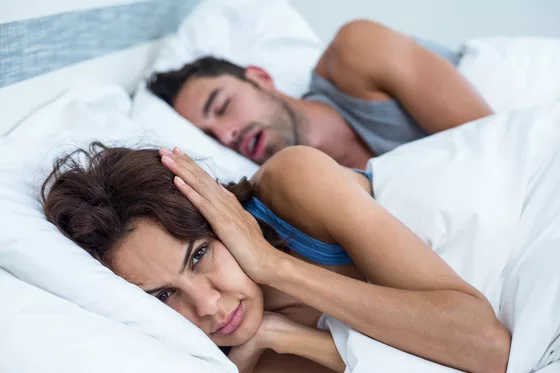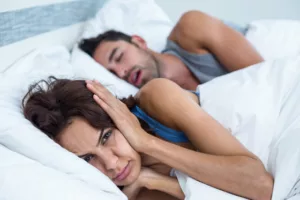How to Stop Snoring: Proven Tips and Home Remedies


How to Stop Snoring: Proven Tips and Home Remedies
- Try to sleep on your side, or stomach, rather than on your back. This allows you to breathe properly and avoids blocked nostrils and nasal passages.
- Pull your pillow to your head. You’ll reduce the pressure on your soft palate (closet) and nasal passages, causing you to snore.
- Use a mouth guard, or add a wedge of foam between your teeth. This mouth guard is filled with softened or rolled oats to provide cushioning and absorb moisture. Once again, this should help to make your throat more open so that it allows air into your lungs.
It is now thought that several risk factors increase the risk of obstructive sleep apnea. The list is long and includes smoking, Snoring, obesity, and depression.
Having a genetic link also increases the chances of you suffering from sleep apnea. You could have an unhealthy microbiome, such as an overgrowth of lactobacilli in the intestinal tract. It is known that this bacteria overgrows in obese patients, producing bad-smelling gas and acid in the colon, and reducing the capacity of the colon to absorb nutrients from food.
Lifestyle changes such as a diet low in fatty foods, a regular exercise routine, and a good night’s sleep can help to manage and prevent sleep apnea.
Keeping your Snoring to yourself
The first step is to stop your Snoring. You can do this by reducing any excess air, using a mouth guard, or relying on pharmaceutical treatment.
The average cost of a mouth guard or a device that slows the flow of air in and out of the body is $70–100, according to Consumer Reports.
For treating obstructive sleep apnea, doctors can prescribe oral contraceptives. Studies have shown they may improve the patient’s quality of sleep and reduce Snoring.
However, the hormones in oral contraceptives can have some unpleasant side effects, so doctors often recommend patients use an effective antihistamine, such as diphenhydramine, to treat the symptoms of sleepiness during the day.
It’s also thought that taking prazosin or clonidine can help to reduce Snoring. This is because the drugs work to block the sympathetic nervous system, which is responsible for sympathetic nervous system dysfunction.
How to treat insomnia
While insomnia is a common symptom of insomnia, it’s sometimes not the cause. Sleep disturbances may be a result of something else, such as a sleep disorder or depression.
There are many possible reasons for insomnia, and many different ways to treat it. If you have a sleep disorder, this includes sleeplessness, nightmares, and sleepwalking. If you have depression, the symptoms can also worsen the problem. Most of the common sleep disorders, such as insomnia, narcolepsy, and parasomnias, occur when the brain doesn’t switch off properly or effectively. In certain cases, sleeping pills may help to treat or manage your symptoms. Some people also find it helpful to speak to a health professional to establish what is causing their insomnia.
Home remedies
Try out these home remedies to try and reduce your Snoring:
Move your body:
Pay attention to your posture while you sleep. Make sure you aren’t lying in an unnatural position. A lowered back position helps to reduce the amount of air flowing into your lungs, which should help to reduce Snoring.
Avoid alcohol:
Too much alcohol in the body can increase the flow of air in and out of the lungs, thus increasing the pressure and volume of Snoring.
Smell candles:
Warm the wax with your breath to make sure it is safe. Another option is to use a snore-curing oil spray that you can apply to the back of the nose and mouth to help alleviate congestion.
Avoid caffeine:
Drinking caffeinated tea or coffee late in the evening, or drinking caffeine before bed, can trigger frequent, shallow breathing.
Avoid blue light:
The light coming from the screen of your phone, computer, and television at night may be stimulating your brain, which may be a contributing factor to Snoring.
See a doctor if the symptoms of Snoring persist
A Snoring problem can become a serious health issue if not addressed properly, particularly if it causes you to fall asleep standing up or suffers from bed sores.
See your doctor if your Snoring is affecting your quality of sleep, and/or if you are a carer for an elderly or disabled relative or friend.
In severe cases, you may need to speak to a healthcare professional about how to treat an underlying medical condition that may be causing your Snoring.
If Snoring is persistent, is waking you during the night, or makes you physically tired during the day, or if your Snoring is preventing you from breathing normally, it may be time to see a doctor for diagnosis and treatment.
Snoring home remedies
Your doctor may recommend a couple of home remedies to help you snore less or reduce the frequency of your Snoring. These remedies can be used both before bed, and if you notice you snore when asleep, such as first thing in the morning.
Breath devices
Breathing devices are designed to improve breathing during sleep. These devices inflate a snorkel or mask over the face, making it difficult to inhale. This encourages more airflow into the lungs to help the person to breathe more deeply and relax into sleep.
There are several different kinds of breathing devices, including the following:
Mouthpieces: Some mouthpieces have hooks to hold the nostrils open for better airflow.
Mouth guards : These help to block out excess air.
Nosespray : Spray a substance over the nose to block out air.
Punch packs: Use this to either put a couple of extra punches into your pillow, or to set your alarm clock for an earlier wake-up time.
Some people find Snoring harder to cope with than others, and you may wish to seek out further support from a medical professional to help you identify your breathing problems and find a solution.
Guided meditation
Meditation can help to relieve stress, anxiety, and exhaustion, and it can also help people to stop Snoring.
Sit cross-legged on a mat or pillow with your back straight and your hands in front of you.
Place the tip of your tongue against the roof of your mouth. Close your mouth and exhale through your nose, keeping your mouth closed.
Keep your jaw and mouth closed for as long as you can, then exhale through your mouth. Repeat several times.
Corticosteroids
Common treatments for Snoring include increasing air intake through sleep pills, nasal sprays, and nasal strips, and sleeping on a back pillow or nasal strips.Other prescription medications may also be effective. Examples include:
Antihistamines :
Can reduce the effects of allergy-related dryness. These are usually available over-the-counter and carry a generic version.
Alpha-2 adrenergic receptor blockers :
This type of medication blocks the release of a hormone in the adrenal glands which causes the body to elevate blood pressure and muscle tension.
Anticholinergic agents :
Can be used to treat neurological conditions such as excessive oral, facial, and sinus saliva production.
Drugs to treat obesity and gastric reflux:
These medications reduce the amount of food that passes through the stomach into the oesophagus.
Common symptoms of sleep apnea include:
- night terrors and daytime sleepiness
- difficulty waking from sleep
- excess daytime sleepiness
- constricted breathing during sleep
- These symptoms may cause you to snore.
Exercise
Exercise may also help to prevent Snoring.The immediate effect of exercise is to make your muscles tense, which is thought to encourage relaxation and breathing techniques to reduce Snoring.If Snoring continues, you may consider giving exercise a try to see if it helps. However, do not exercise for more than 20 minutes at a time.
Prescription medications
Some medications may help to stop Snoring. Prescription medications may help to stop Snoring.There are several medications that can be used to reduce Snoring.Minocycline is an antibiotic that can help to reduce Snoring due to halitosis. A 2011 review of evidence supports the use of minocycline to treat Snoring, but a 2013 review has not found evidence of its effectiveness.Minocycline is available without a prescription from a doctor or pharmacy.
Carisoprodol is an over-the-counter anti-inflammatory pain medication. The effectiveness of carisoprodol to treat Snoring is controversial. A 2013 systematic review assessed the available studies, which revealed that it may be effective in some people.
However, a 2013 systematic review of medical literature from PubMed found that there was a lack of evidence supporting carisoprodol’s effectiveness. A review published in 2014 found that carisoprodol has no significant effect on Snoring.
Other medications that may be helpful include:
benzodiazepines :
These drugs are often used to treat anxiety and sleep problems. They can cause drowsiness and sedation. Benzodiazepines may have a sedating effect on sleeping partners.
clonidine :
Clonidine has anticonvulsant properties. A 2005 systematic review found that clonidine may be useful in treating Snoring.
hydroxyzine :
Hydroxyzine is a common drug used to treat sleepiness, anxiety, and depression. It may also improve quality of sleep in people with sleep apnea.
non-benzodiazepine hypnotics :
These are older medications such as trazodone and zolpidem. They reduce anxiety and insomnia without sedating a person. A 2011 review of studies found that these hypnotics may help to treat Snoring.
melatonin:
This hormone may help to promote sleep and reduce wakefulness. Many over-the-counter products containing melatonin are available. There is no firm evidence for melatonin to treat Snoring.
What is the most effective way to stop Snoring?
The most effective way to stop Snoring is to treat the underlying cause of Snoring. A person should see a doctor if Snoring is due to conditions such as sleep apnea. A doctor can arrange for sleep tests to determine whether there is sleep apnea, and then treat it. A doctor may recommend that people take prescribed treatments that could help with Snoring.
It may also be helpful for a person to:
- fall asleep on their side
- avoid sleeping with their head forward
- use mouthpieces to improve airflow to the lungs
- Restricting alcohol use may also help to reduce Snoring
Summary
Snoring is a common sleep disorder, which is often the result of breathing problems. People with Snoring often have underlying sleep apnea. Snoring can be a major problem when a person has sleep apnea. Sleep apnea is a condition that causes a person to stop breathing in their sleep. It can be life-threatening, but many people live with it undiagnosed. If a person does not get treated, it can make it harder to fall asleep and sleep through the night. A person may also snore loudly, which may disturb a person or their sleeping partner.
Many Snoring treatments are available. This article has a summary of the effectiveness of treatment options, as well as the potential risks and side effects.
If Snoring is affecting a person’s ability to sleep or waking the person up, they should see their doctor or seek medical advice.
If a person has a partner who is also Snoring, they may want to have a sleep test to learn more about the condition.
Contact a doctor immediately if a partner’s Snoring is causing a problem. A doctor may recommend treatments that have a chance of resolving the Snoring problem.
Many people have Snoring problems, particularly after a night of heavy drinking. If Snoring is affecting a person’s quality of life or the sleep of their partner, it is essential to talk to a doctor. A doctor can help to diagnose a range of conditions, such as sleep apnea and restless legs syndrome. It is crucial that people with Snoring issues seek medical attention as soon as possible. Many treatments for Snoring are available. A doctor may prescribe medication or a specific breathing device to help.
It is also important to ensure that a person exercises and eats a balanced diet. A weight-loss program may help to reduce Snoring as well as other health problems. A doctor may also recommend anti-Snoring mouth guards to help with the Snoring.
Research the products that are available to help treat Snoring. It may be beneficial to try these before deciding which one is best for a person.
Many Snoring treatments are available and effective. Sometimes, a doctor may recommend a combination of treatments. These might include using a mouth guard, which can help improve the position of the jaw, and avoiding certain foods that can cause the jaw to stay open.
All treatment options can have side effects, and it is important to discuss them with a doctor. The outlook for Snoring depends on whether a person has sleep apnea or other underlying conditions, as well as the effect of a certain treatment. If a person has severe Snoring, a doctor may suggest treatment to help with the condition.
Often, a person will require treatment until the Snoring becomes less severe. They should speak to their doctor about this.
Prevention
Some lifestyle changes can help reduce the risk of Snoring.These include avoiding heavy, alcoholic drinks and alcohol use, as well as getting at least eight hours of sleep at night. A diet high in fiber, as well as adequate calcium, iron, and vitamin B12, can help a person fall asleep more easily and restful.
It is not always possible to prevent Snoring, but the following lifestyle choices may help:
- eating a healthful diet
- getting enough sleep at night
- avoiding excess alcohol consumption
- maintaining a healthy weight
- drinking in moderation
Learning more about your risk factors and the impact of Snoring is important.
It may also be useful to discuss the types of treatments that may be available with a doctor. A person may decide that their lifestyle is not suitable for a specific treatment.

